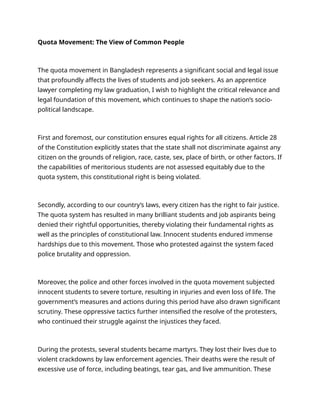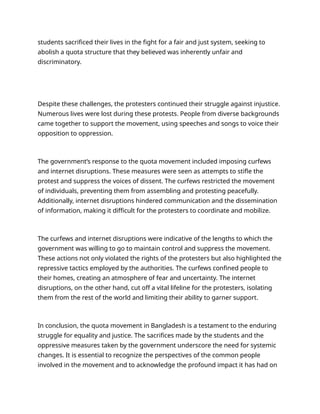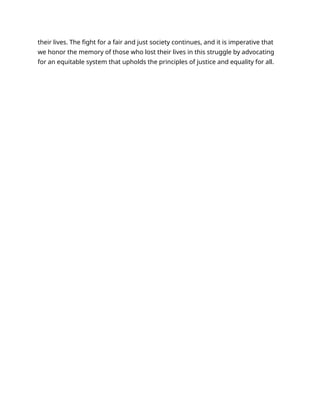Quota Movement: The View of Common People
- 1. Quota Movement: The View of Common People The quota movement in Bangladesh represents a significant social and legal issue that profoundly affects the lives of students and job seekers. As an apprentice lawyer completing my law graduation, I wish to highlight the critical relevance and legal foundation of this movement, which continues to shape the nationâs socio- political landscape. First and foremost, our constitution ensures equal rights for all citizens. Article 28 of the Constitution explicitly states that the state shall not discriminate against any citizen on the grounds of religion, race, caste, sex, place of birth, or other factors. If the capabilities of meritorious students are not assessed equitably due to the quota system, this constitutional right is being violated. Secondly, according to our countryâs laws, every citizen has the right to fair justice. The quota system has resulted in many brilliant students and job aspirants being denied their rightful opportunities, thereby violating their fundamental rights as well as the principles of constitutional law. Innocent students endured immense hardships due to this movement. Those who protested against the system faced police brutality and oppression. Moreover, the police and other forces involved in the quota movement subjected innocent students to severe torture, resulting in injuries and even loss of life. The governmentâs measures and actions during this period have also drawn significant scrutiny. These oppressive tactics further intensified the resolve of the protesters, who continued their struggle against the injustices they faced. During the protests, several students became martyrs. They lost their lives due to violent crackdowns by law enforcement agencies. Their deaths were the result of excessive use of force, including beatings, tear gas, and live ammunition. These
- 2. students sacrificed their lives in the fight for a fair and just system, seeking to abolish a quota structure that they believed was inherently unfair and discriminatory. Despite these challenges, the protesters continued their struggle against injustice. Numerous lives were lost during these protests. People from diverse backgrounds came together to support the movement, using speeches and songs to voice their opposition to oppression. The governmentâs response to the quota movement included imposing curfews and internet disruptions. These measures were seen as attempts to stifle the protest and suppress the voices of dissent. The curfews restricted the movement of individuals, preventing them from assembling and protesting peacefully. Additionally, internet disruptions hindered communication and the dissemination of information, making it difficult for the protesters to coordinate and mobilize. The curfews and internet disruptions were indicative of the lengths to which the government was willing to go to maintain control and suppress the movement. These actions not only violated the rights of the protesters but also highlighted the repressive tactics employed by the authorities. The curfews confined people to their homes, creating an atmosphere of fear and uncertainty. The internet disruptions, on the other hand, cut off a vital lifeline for the protesters, isolating them from the rest of the world and limiting their ability to garner support. In conclusion, the quota movement in Bangladesh is a testament to the enduring struggle for equality and justice. The sacrifices made by the students and the oppressive measures taken by the government underscore the need for systemic changes. It is essential to recognize the perspectives of the common people involved in the movement and to acknowledge the profound impact it has had on
- 3. their lives. The fight for a fair and just society continues, and it is imperative that we honor the memory of those who lost their lives in this struggle by advocating for an equitable system that upholds the principles of justice and equality for all.



